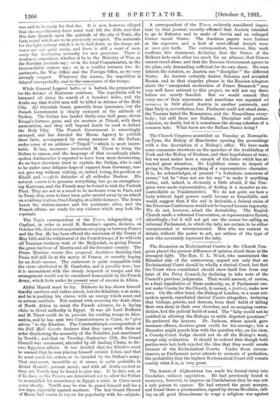The discussion on Ecclesiastical Courts in the Church Con- gress
placed the present difference of opinion about them in the strongest light. The Hon. C. L. Wood, who maintained the Ritualist side of the controversy, argued not only that an Ecclesiastical Court should be wholly a clerical Court, but that the Court when constituted should show itself free from any taint of the Privy Council, by declining to take note of the Council's previous judgments. That would amount, of course, to a final repudiation of State authority, as, if Parliament can- not make Courts for the Church, it cannot, a fortiori, make new laws. On the other hand, the Bishop of London, in a most out- spoken speech, repudiated clerical Courts altogether, declaring that bishops, priests, and deacons, from their habit of telling their own story in their own churches, and so escaping contra- diction, lost the judicial habit of mind. The "laity would not be justified in allowing the Bishops to settle disputed questions." He preferred the lawyers. Dr. Jackson, whose speech gave immense offence, deserves great credit for his courage ; but a Dissenter might puzzle him with the question why, on his view, a County-Court Judge should not do all the Bishop's work, except only ordination. It should be noticed that though both parties were hot, both rejected the idea that they would swede because of the Ecclesiastical Courts. Under those circum- stances, as Parliament never attends to counsels of perfection, the probability that the highest Ecclesiastical Court will remain exactly what it is, is very great.






























 Previous page
Previous page